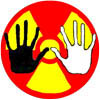Please enjoy this beautiful photographic summary of the 2018 ANFA meeting set to the powerful words of current SA ANFA Co-chair Dwayne Coulthard.
And see below the slideshow for the 2018 ANFA Meeting Statement

Australian Nuclear Free Alliance National Meeting Statement
21st October 2018
Members of the Australian Nuclear Free Alliance (ANFA) met on Kaurna and Peramangk country over the weekend of 19-21 October 2018.
Dozens of Aboriginal Nations[1]and civil society organisations[2]were represented; people came together to share stories, strategy and solidarity.
The nuclear industry impacts the lives and country of Aboriginal people in many ways.
The federal government has been trying to find a site for a radioactive waste dump for over two decades. Every proposed site has been on Aboriginal land and at every site Aboriginal people have resisted and stopped the plan. Adnyamathanha, Barngarla and Kokatha commuinites in regional South Australia are currently being targeted for a national radioactive waste dump and store and ANFA stands with them in solidarity against this federal government push.
Representatives from Brewarrina in NSW and Leonora in WA voiced their opposition to the nomination of sites in their regions for the national nuclear dump. Together we are stronger and we will continue to support each other to fight waste dumps wherever the community does not want it.
Wherever it happens uranium mining impacts disproportionately on Aboriginal communities. In Australia there is an extensive history of adverse impact on country and communities and a sustained and powerful tradition of resistance. This year marks 35 years since the Olympic Dam blockade and the meeting paid particular respect to the late Ms Eileen Wingfield and those Kokatha and other Aboriginal people who led this powerful protest at the time. The meeting welcomed the recognition given to Koongarra senior Traditional Owner Jeffrey Lee, the recipient of the 2018 Nuclear Free Future Award. The gathering heard stories of resistance to planned uranium mining in WA and to the important efforts of the Mirarr people of Kakadu to ensure the comprehensive clean up of the Ranger uranium mine and the transition to a vibrant post mining regional economy.
ANFA members are living with the legacy of nuclear weapons testing on their country, this year is 65 years since the tests at Emu Field. We have heard from affected communities that the land is crying. ANFA welcomed the efforts of members involved in the International Campaign to Abolish Nuclear Weapons in advancing an International Treaty to Prohibit Nuclear Weapons and were very pleased that ICAN’s 2017 Nobel Peace Prize medal was at the meeting and able to be shared. ANFA will continue to push the Australian government to sign and ratify the ban treaty and to ensure justice, recognition and repair for country and communities that continue to be impacted by earlier nuclear weapons tests and trials in Australia.
The meeting discussed the dangers of transporting radioactive materials on road, rail and ships. There is a risk to workers handling these materials as well as communities targeted to host facilities. ANFA will continue to outreach to transport workers around the world to ensure safety in workplaces as well as in our communities.
ANFA turns 21 this year and the meeting was marked by a strong youth representation. Several senior members have been involved for all or most of the past 21 years giving the Alliance powerful continuity. We remember and honor those who have passed on and enthusiastically welcome the new and young members. In an ANFA first a delegation of youth compiled a statement to be presented to the United Nations at an upcoming forum.
The meeting elected a renewed and energetic committee and concluded with an enthusiastic commitment to continue our shared work. We will keep supporting each other through our many struggles and share the joys of our victories as we continue to resist the nuclear industry.
Statement passed on 21st October, 2018.
[1]Nations: Adnyamathana, Adnayamathana/Alumtja, Adnayamathana/Kuyari, Arrabunna, Balladong, Gamilaraay, Gumbaynggir, Kaurna Arabunna, Koara, Kokatha, Kokatha Mula, Manjiljarra, Maralinga Tjarutja, Mirarr, Ngemba, Noongar, Nygenna Walmajarri Nyhul Nyhul Mungala, Pinjan, Pitjantjatjara, Tangane Kald/Meintangk/Boandik, Thudgarri/Yinngarrda, Tjiwarl, Wiradjuri/Gomeroi, Wongatha, Yamatji, Yorta Yorta, Yulparija, Yulparija/Warnman
[2]Organisations: Aboriginal Tent Embassy Canberra, Anti Nuclear Alliance Western Australia, Australian Conservation Foundation, Ban Uranium Mining Permanently, Beyond Nuclear Initiative, Beyond Uranium Canberra, Conservation Council of South Australia, Conservation Council of Western Australia, Friends of the Earth, Gundjeihmi Aboriginal Corporation, International Campaign to Abolish Nuclear Weapons, Maritime Union of Australia (Sydney Branch), No Dump Alliance, Uranium Free New South Wales, Walkatjurra Walkabout, West Australian Nuclear Free Alliance, 3CR Community Radio

